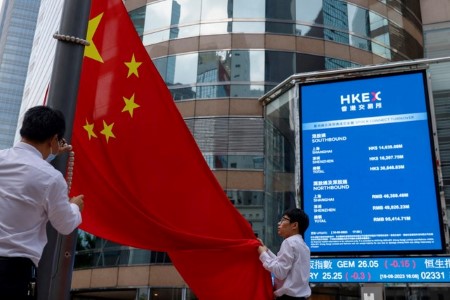




Inflation Update: Weak demand softens shocks
 DOWNLOAD
DOWNLOAD

Monthly Economic Update: Fed cuts incoming
 DOWNLOAD
DOWNLOAD

Consensus Pricing – June 2025
 DOWNLOAD
DOWNLOAD


TOP SEARCHES
China stocks drop on heightened trade tensions, automakers’ price war

HONG KONG – China and Hong Kong stocks fell on Thursday, as investors feared an escalation of the trade war with the US and a further ban on chip sales to China, while a price war between automakers in the country looked set to intensify.
**The blue-chip CSI 300 index closed down 0.88%, while the Shanghai Composite index slid 0.43% at 3,295.70.
** Most sectors closed lower as investors were largely in a wait-and-see mode for clarity on US President-elect Donald Trump’s trade policies and its potential consequences.
** Auto stocks were the biggest decliners, falling by more than 2%, after media reports said that BYD and other automakers pushed suppliers to cut prices, signaling that a brutal price war in the world’s largest auto market is set to escalate.
** BYD’s Hong Kong and mainland shares fell 2.6% and 2.3% respectively, while SAIC Motor Corp declined by 2.8%.
** In Hong Kong, the Hang Seng Index was down 236.17 points or 1.2% at 19,366.96. The Hang Seng China Enterprises index fell 1.46%, while the Hang Seng Tech lost 1.52%.
** China’s state media warned Trump his pledge to slap additional tariffs on Chinese goods could drag the world’s top two economies into a mutually destructive tariff war.
** “A key risk for China’s economy and markets in 2025 comes from Trump’s policies-the proposed tariffs of 60% could reduce GDP growth by up to 2% over the next four to six quarters,” Michelle Qi, head of China equities at Eastspring Investments, said in a note.
** Sentiment was further dented after Bloomberg News reported that the Biden administration could announce additional curbs on sales of semiconductor equipment and artificial intelligence memory chips to China as soon as next week.
** That also weighed on the broader consumer stocks listed both onshore and offshore.
** The smaller Shenzhen index ended down 0.65% and the start-up board ChiNext Composite index was weaker by 1.77%.
** Around the region, MSCI’s Asia ex-Japan stock index was weaker by 0.52%, while Japan’s Nikkei index closed up 0.56%.
(Reporting by Summer Zhen; Editing by Abinaya Vijayaraghavan and Varun H K)
This article originally appeared on reuters.com





 By Reuters
By Reuters